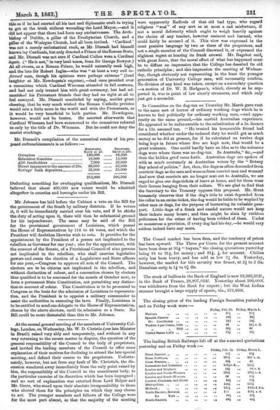At the annual general meeting of the members of University
Col- lege, London, on Wednesday, Mr. W. D. Christie (our late Minister in Brazil) raised very ably and temperately, and without in any way returning to the recent matter in dispute, the question of the general responsibility of the Council to the body of proprietors, and invited the leading members of the Council to offer some explanation of their motives for declining to attend the late special meeting, and defend their course to the proprietors. Unfortu- nately, however, but not from any fault of Mr. Christie's, the dis- cussion wandered away immediately from the only point raised by him, the responsibility of the Council to the constituent body, to the particular exercise of its discretion which has been impugned ; and no sort of explanation was extorted from Lord Belper and Mr. Grote, who stood upon their absolute irresponsibility to those who elected them for the principles on which they may choose to act. The younger members and fellows of the College were for the most part absent, so that the majority of the meeting were apparently Radicals of that old bad type, who regard religious " zeal" of any sort as at most a sad misfortune, if not a moral deformity which ought to weigh heavily against the choice of any teacher, however eminent and learned, who could fairly be accused of it. This view was expressed in the most positive language by two or three of the proprietors, and not a single member of the Council disowned it, or expressed the slightest regret at hearing its frank avowal. Mr. Bagehot said, with great force, that the moral effect of what has happened must be to diffuse an impression that the College has deserted its old catholic principles ; and this impression the meeting of Wednes- day, though obviously not representing in the least the younger generation of University College men, will necessarily confirm. No division of any kind was taken, except ou a secondary question —a motion of Dr. W. B. Hodgson's, which, cleverly as he sup- ported it, was in point of law clearly erroneous, and which only just got a seconder.






























 Previous page
Previous page